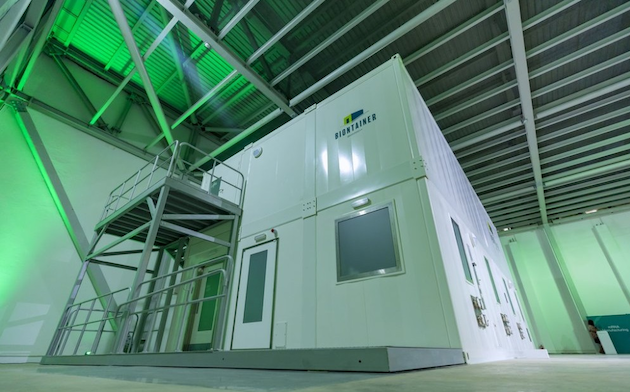Kigali – An agreement signed between the Government of Rwanda and the African Pharmaceutical Technology Foundation (APTF) is giving a boost to Africa's domestic industry in hopes of helping the continent address vaccine inequality and fill a critical gap in its production.
The agreement to launch the foundation was signed in late 2023 in Kigali, the capital of Rwanda.
What is key, according to stakeholders, is to focus efforts on building a resilient and self-sufficient pharmaceutical sector for the continent. This was evident during Covid-19, for example, when COVAX, the multilateral mechanism for equitable global access to coronavirus vaccines, helped low-income economies achieve 57% two-dose coverage. Compared to the global average of 67%.
Officials and scientists happily point out that the benefit of such an initiative is to close the vaccine equity gap between African countries and the industrialized world.
In the implementation phase, the African Development Bank (ADB) has pledged to invest up to $3 billion over the next decade in the development of pharmaceutical products.
The foundation, which will become operational in January 2024, will dedicate its core mandate to addressing some of the common challenges faced by indigenous African pharmaceutical companies, including weak human and institutional capacities and low technical capacity to adopt and deploy new technologies.
“The Trust has committed to ensuring that Africa has what it needs to build its own health care system, which should include a thriving African pharmaceutical industry and quality health infrastructure,” said ADB President Akinwumi Adesina.
APTF Executive Director Padma Shri Kehal Sampath told IPS that access to know-how, technologies and processes to manufacture pharmaceutical products is clearly needed to ensure sustainability of financial investments.
However, he points out that financial, infrastructural, strategic and regulatory support is insufficient to ensure the sustainability and viability of the national pharmaceutical sector in Africa.
“Capacity development and diversification in the pharmaceutical value chain requires a clear and sustainable approach to technology transfer and knowledge sharing,” he said in an exclusive interview.
While technology has been described as a key transformative tool to help develop a competitive pharmaceutical industry in Africa, Sampath stresses the need to build political capacity to facilitate the sector.
According to him, this can be achieved by implementing flexibility in the agreement for trade-related aspects of intellectual property rights and allowing local companies to access domestic markets.
In an effort to overcome these challenges, the Foundation's work received a major boost from a Memorandum of Understanding signed in December in Kigali to partner with the European Investment Bank.
The European Investment Bank will “partner the Regional Biosimilars Program for the production and innovation of relevant biosimilars in Africa and facilitate the development of active pharmaceutical ingredient pools in selected specific sub-regions of Africa,” the body said. Report.
According to Sampa, there is a need to remove barriers to indigenous innovation in Africa.
“We need to work with our universities and public research institutes to make them centers of excellence,” he said.
You can read the English version of this article here.
In the implementation phase, the first modular components of the German company BioNTech's factory, based on sea containers, were delivered in March in Kigali, then assembled and opened in December 2023.
The company, which co-developed the Covid vaccine widely used in the West with its American partner Pfizer, has developed a plan for African countries to produce its Comirnaty brand of vaccine by 2022 under the supervision of BioNTech.
BioNtech said the initial vaccine factory will become part of a wider distribution network spanning several African countries, including Senegal and South Africa, in the coming years.
When BioNTech announced its plans to expand in Africa, it delayed sending Western-made coronavirus vaccine doses to the continent, drawing much criticism.
“The African Union has come together to make a firm commitment not to find ourselves in this situation again,” Rwandan President Paul Kagame said at the inauguration of the plant, located in Masoro, a suburb of Kigali.
“Biontech's partnership with Africa means we can democratize vaccine technology, but we could not have gotten to this point without a broader partnership,” Kagame said.
European Investment Bank Vice President Gelsomina Vigliotti said the bank is committed to working with its partners to strengthen public health and health innovation across Africa.
“Strengthening access to finance is essential to increase pharmaceutical investment and innovation across Africa,” said Vigliotti.
According to experts, a key manifestation of Africa's scientific and technological innovation capacity is the use of innovation to develop its pharmaceutical sector.
The newly established plant in Kigali, a suburb of the Rwandan capital, is expected to start producing 50 million vaccines, but production will increase depending on demand for potential mRNA-based vaccines against malaria and tuberculosis.
But researchers and policymakers argue that trust and cooperation are key to successfully implementing this innovation.
Recent assessments by the World Health Organization (WHO) show that industrial development must be linked to national global health policy so that local vaccine production can meet local health needs.
Before the Biotech factory opened in Rwanda, there were fewer than 10 African manufacturers of vaccines in five countries: Egypt, Morocco, Senegal, South Africa and Tunisia.
According to the WHO, the ability to produce vaccines in Africa requires a fully integrated approach that integrates some key elements, including funding, capacity building, regulatory facilities and technical know-how.
T: MLM / ED: EG

